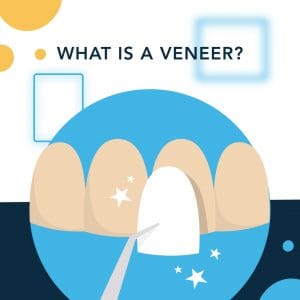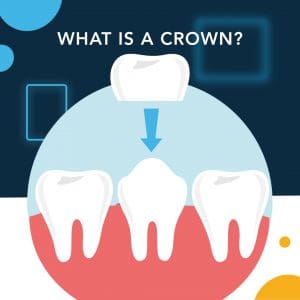When it comes to improving the appearance and functionality of your teeth, two popular options are veneers and crowns. Both treatments can transform your smile, but they serve different purposes and come with distinct advantages and considerations. Whether you’re looking to correct discoloration, fix a broken tooth, or enhance your overall smile, understanding the nuances of each option can help you make an informed decision about which treatment is best suited for your dental needs.
What’s the Difference Between Veneers & Crowns?
Veneers and crowns are both dental treatments designed to improve teeth appearance, but they differ significantly in application and structure. Veneers are thin shells that cover only the front surface of the teeth, primarily for cosmetic enhancement. Crowns, on the other hand, encapsulate the entire tooth, providing both cosmetic improvements and structural reinforcement for damaged or decayed teeth.
What is a Veneer?
A veneer is a thin, custom-made shell typically crafted from porcelain or composite resin, designed to cover the front surface of a tooth. Veneers are primarily used to enhance cosmetic appearance by improving the color, shape, size, or length of teeth. They are popular for their ability to provide a natural look and long-lasting cosmetic solutions.
Pros of Veneers

Veneers offer a natural appearance and can dramatically improve the aesthetics of one’s smile by altering the color, shape, and alignment of teeth. Compared to crowns, they require minimal removal of tooth structure, preserving more of the natural tooth. Veneers are also stain-resistant, providing a durable and long-lasting solution for enhancing dental appearance.
Customization
Veneers are highly customizable, allowing for a tailored fit and appearance that matches your natural teeth. This customization makes them an excellent choice for those looking to correct specific cosmetic issues such as discoloration, gaps, or irregular shapes, ensuring the results blend seamlessly with the surrounding teeth for a flawless smile.
Durability
Veneers are renowned for their durability, often lasting 10 to 15 years or more with proper care. Made from strong materials like porcelain, they are resistant to chips and stains, making them a reliable long-term solution for improving the aesthetic appearance of teeth while withstanding the demands of everyday use.
Minimally Invasive
One of the significant benefits of veneers is their minimally invasive nature. The procedure typically requires only a small amount of the tooth’s original enamel to be removed to fit the veneer. This preservation of the natural tooth structure is less traumatic compared to other restorative options, making veneers a preferred cosmetic solution.
Immediate Results
Veneers provide immediate results, transforming your smile in just a few visits to the dentist in Broward County. Once applied, they instantly correct imperfections such as discoloration, chips, and gaps, offering a fast and effective way to achieve a more aesthetically pleasing appearance without the lengthy treatment times associated with other orthodontic or restorative procedures.
Stain Resistance
A notable benefit of veneers is their exceptional stain resistance, especially those made from porcelain. This quality ensures that veneers maintain their bright, white appearance over time, resisting stains from coffee, tea, wine, and other substances that typically discolor teeth. This makes veneers an excellent choice for a consistently beautiful and low-maintenance smile.
Aesthetic Improvement
Veneers significantly enhance the aesthetics of your smile by correcting a variety of dental imperfections. They effectively cover stains, chips, and misalignments, and can even alter the size and shape of teeth to create a more uniform look. This aesthetic improvement can boost confidence and dramatically improve one’s appearance.
Low Maintenance
Veneers are easy to maintain and require the same care as natural teeth, such as regular brushing, flossing, and dental check-ups. They are durable and resistant to stains, which means that maintaining a beautiful smile doesn’t require any extra effort or special products. This makes veneers a convenient option for those seeking a straightforward and effective cosmetic dental solution.
Cons of Veneers
While veneers offer many benefits, they also have drawbacks. They are irreversible because a portion of the tooth enamel is removed for their placement. Veneers can sometimes detach and may need replacement, adding potential long-term costs. Additionally, if tooth decay develops underneath, the entire veneer must be removed for treatment.
Veneers are Irreversible
One significant con of veneers is their irreversibility. The process involves removing a portion of the tooth’s enamel to accommodate the veneer, a change that cannot be undone. This permanent alteration means that once you opt for veneers, you are committed to maintaining them or seeking other permanent restorative solutions.
Cost
The cost of veneers can be a significant drawback, as they are one of the more expensive cosmetic dental treatments. Not typically covered by insurance, veneers require a substantial out-of-pocket investment. Additionally, because they can chip or detach, future replacements or repairs may increase the overall financial commitment.
Tooth Sensitivity
Tooth sensitivity can emerge as a con of veneers due to the removal of a portion of the tooth’s enamel during the application process. This thinning of enamel exposes the underlying dentin, making the teeth more susceptible to temperature sensitivity when consuming hot or cold foods and drinks, which can be uncomfortable for the patient.
Not Repairable
A notable disadvantage of veneers is that they are not repairable. If a veneer chips or cracks, it cannot simply be fixed or patched; the entire veneer must be replaced. This can add unexpected costs and inconvenience, particularly since veneers are already a more expensive cosmetic dental option.
Color Match
A challenge with veneers is achieving an exact color match with the surrounding natural teeth. Over time, natural teeth may change color due to factors like aging or diet, while the veneer remains the original shade. This can lead to a noticeable mismatch, affecting the uniformity and aesthetics of your smile.
Damage to Natural Teeth
One significant downside of veneers is the potential damage to natural teeth. The process requires removing a thin layer of enamel, which is irreversible and can weaken the tooth structure. This alteration makes the teeth permanently reliant on the protective covering of veneers, increasing their vulnerability to future issues.
Risk of Detachment
A notable con of veneers is the risk of detachment. Although designed to adhere strongly to teeth, veneers can sometimes come loose or fall off, particularly if subjected to excessive force from habits like teeth grinding, biting hard foods, or trauma. Detachment requires prompt dental intervention to reattach or replace the veneer, incurring additional costs and inconvenience.
Lifespan
While veneers can significantly enhance a smile, they do have a limited lifespan, typically lasting 10 to 15 years before needing replacement. This relatively short lifespan can be seen as a downside, considering the high initial cost and the irreversible nature of the procedure, requiring ongoing investment in maintenance and eventual replacement.
 What is a Crown?
What is a Crown?
A crown is a form of dental restoration that fully covers or “caps” a tooth or dental implant. Crowns are often used when a significant amount of tooth structure has been lost due to decay, damage, or to strengthen teeth that have been weakened by extensive restoration. They can be made from various materials, including porcelain, ceramic, metal, or a combination, to ensure durability and a natural appearance.
Pros of Crowns
Crowns are a popular dental option that offers multiple benefits. They provide strong protection for damaged teeth and effectively restore function and aesthetics. Crowns are highly durable, capable of withstanding biting and chewing forces, and with proper care, they can last for decades. Additionally, they provide a solution for various dental issues such as repairing cracked teeth, covering discoloration, and supporting weak teeth after extensive restorative procedures.
Strength & Durability
Renowned for their strength and durability, crowns make an excellent choice for restoring damaged teeth. Constructed from robust materials like porcelain, ceramic, or metal, crowns can withstand the rigors of daily chewing and biting for many years. This durability helps preserve the tooth’s functionality and appearance, often for decades with proper care.
Protection for Damaged Teeth
Crowns provide essential protection for damaged teeth. They effectively encapsulate the entire tooth, safeguarding it from further decay, damage, and wear. This full coverage is particularly beneficial for teeth that are cracked, extensively decayed, or have undergone significant restorative work, such as root canal therapy.
Aesthetic Improvement
A major advantage of crowns is that they offer significant aesthetic improvements for teeth that are discolored, misshapen, or badly damaged. Each crown is custom-made to match the shape, size, and color of your natural teeth, providing a seamless and attractive appearance.
Versatility
Crowns are highly versatile, effectively addressing a range of dental issues. They can be used to strengthen weakened teeth, restore broken or worn-down teeth, cover dental implants, or improve the cosmetic appearance of teeth. Additionally, crowns are adaptable to different materials, including porcelain, ceramic, and metal, to best suit individual needs and preferences.
Custom Fit
Crowns are tailored to provide a custom fit, ensuring they integrate perfectly with your bite and the rest of your teeth. Each crown is meticulously crafted to match the color, size, and shape of your natural teeth, offering a comfortable and seamless addition to your dental structure.
Low Maintenance
Beneficial for their low maintenance, crowns require the same care as your natural teeth. Regular brushing, flossing, and dental check-ups are sufficient to keep them in good condition. This simplicity in upkeep makes crowns a convenient option for long-term dental health, without needing special treatments or extra care routines.
Cons of Crowns
Crowns are a dental treatment that effectively restores and protects teeth. However, they do have some potential drawbacks. The process of getting a crown can be invasive and often requires significant alteration of the natural tooth structure. Over time, the aesthetics of the crown may not be as pleasing as those of other less invasive options, depending on the materials used. Additionally, although crowns generally have a long lifespan, this can vary and may require future replacements, which could involve further expense and treatment.
Cost
Crowns can be a costly option, especially when made from high-quality materials like porcelain. They are often more expensive than other dental treatments due to the customization and skilled labor required. Additionally, they are sometimes not fully covered by dental insurance, leading to higher out-of-pocket expenses.
Tooth Preparation
Preparing a crown involves permanently altering the natural tooth structure. This process requires removing a significant portion of the tooth enamel to accommodate the crown. Such an extensive alteration can weaken the original tooth, making it wholly dependent on the artificial covering for structural integrity.
Discomfort
The process of getting a crown can cause temporary discomfort and sensitivity. The tooth preparation involved might lead to sore gums and discomfort in the surrounding teeth. In addition, patients may experience sensitivity to hot and cold temperatures immediately after the crown is placed.
Risk of Damage
While crowns strengthen damaged teeth, they themselves can be susceptible to chipping or cracking, especially those made from porcelain. Activities such as grinding teeth, biting on hard foods, or trauma to the mouth increase the risk of damaging the crown.
Gum Disease
Improper crown fitting can lead to gaps between the crown and the gum line, creating spaces for bacteria to thrive. If not addressed promptly, this can increase the risk of gum disease and lead to further oral health complications.
Color Matching Issues
Achieving a perfect match between the color of the crown and the natural teeth can be challenging, particularly if the natural teeth discolor over time while the crown does not. This can result in visible aesthetic differences that are difficult to correct without replacing the crown.
Replacement
Despite their durability, crowns do not last forever and will eventually need to be replaced. Factors such as wear and tear, dental hygiene, and mouth-related habits can affect their lifespan. Replacing a crown involves similar costs and procedures as the initial placement, potentially adding to the long-term expense and inconvenience.
How Do You Know Which One is Right for You?
Deciding between veneers and crowns depends on your specific dental needs and aesthetic goals. Veneers are ideal for cosmetic improvements like altering tooth color and shape without extensive tooth modification. Crowns, however, are better for restoring teeth that are significantly damaged or decayed, offering structural support and full coverage. A consultation with a dentist in Davie, Florida, can help determine which option best suits your individual circumstances.
Consider Your Goals
When considering dental treatment, it is important to determine what you hope to achieve. If your main goal is to improve the look of your teeth by changing their shape or color, veneers may be the best option for you. However, if you need to repair damaged or decayed teeth and restore their functionality, then crowns may be more suitable.
Evaluate Your Tooth Structure & Health
Assessing the current health and structure of your teeth is crucial in choosing between veneers and crowns. Veneers are suitable for teeth that are fundamentally healthy and require minimal shape alteration. In contrast, crowns are necessary for teeth that have undergone significant damage or decay, as they provide extensive coverage and strength.
Understand the Procedure
Understanding the specifics of each procedure can guide your decision. Veneers typically require less removal of the tooth structure and focus on the front surface, making them less invasive. Crowns encompass the entire tooth, which may involve more extensive preparation and alteration of the tooth’s natural structure.
Schedule Your Next Dental Checkup Appointment
Scheduling your next dental checkup is a vital step in maintaining optimal oral health. Regular dental visits are essential not only for professional cleaning but also for early detection and management of potential dental issues such as cavities, gum disease, and even oral cancer. If you’re interested in cosmetic treatments such as veneers or dental crowns, speaking with a Davie dentist can help you learn about your options while discussing your goals. Call our office to schedule your next dental checkup appointment with a dentist near me.
August 9, 2024

 Adult
Adult



 What is a Crown?
What is a Crown?